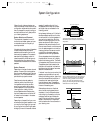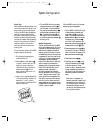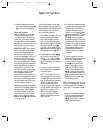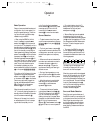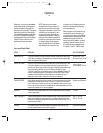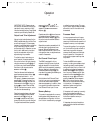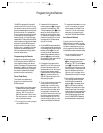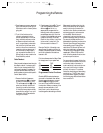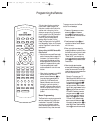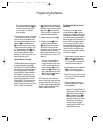Operation
Surround modes are selected using either
the front panel controls or the remote. To
select a surround mode from the front
panel, simply press the button that corre-
sponds to the desired mode
(ÓÔ
. To select a surround mode using the
remote, press the Surround Mode
Selector y, and then press the
⁄
/
¤
buttons g to change the mode. As
you press the buttons, the surround
mode name will appear in the Main
Information Display S, and an
individulal mode indicator will also
light up D/F/J.
Note that the Dolby Digital Mode may
only be selected when a Dolby Digital
source is playing. For more information
on Dolby Digital, see the following section
of this manual.
To listen to a program in traditional two-
channel stereo, using the front left and
front right speakers only (plus the sub-
woofer if installed and configured), press
the Surround Off buttonÚ on the
front panel, or follow the insturctions
shown above for using the remote until
SURR OFF appears in the Main
Information Display S. When the
AVR45’s surround circuits are turned off,
and it is in the Stereo mode, the BYPASS
indicator B will illuminate in the
Information Display
˝
.
Digital Audio Playback
Dolby Digital
Dolby Digital (also known as AC-3) is the
latest advancement in surround-sound
technology, delivering up to five full-
range surround channels (left, center,
right, left surround and right surround)
plus a special dedicated Low-Frequency
Effects (LFE) channel. This represents a
major advancement over traditional
analog surround in that each surround
channel is fully discrete and capable of
full bandwidth reproduction. Dolby
Digital is available on DVD and LV discs,
and it will be a part of the new high-
definition television (HDTV) system
when digital broadcasting begins in
1998. Dolby Digital for the home is based
on the same system used to deliver digital
audio sound tracks in movie theaters,
enabling true cinema reproduction in
your home.
To utilize the Dolby Digital mode you
must have a digital source properly
connected to the AVR45. Connect the
Digital datastream outputs from DVD
players, HDTV receivers and CD players to
the AC-3/PCM Coaxial or Optical
inputs on the rear panel °·. In order
to provide a backup signal and a source
for recording, the analog outputs provid-
ed on digital source equipment should
also be connected to their appropriate
inputs on the AVR45 rear panel (e.g.,
connect the analog stereo audio output
from a DVD to the
DVD inputs ¶ on
the rear panel when you connect the
digital outputs.)
When playing back a digital source, first
select the input using the remote or front
panel controls as outlined above. Next
select the digital source by pressing the
appropriate Digital Input button w
ˆ and then using the
⁄
/
¤
buttons g
on the remote or the Selector buttons
¸ on the front panel to choose either
COAXIAL or OPTICAL, as it appears
in the Main Information Display S.
Press the Set button i˜to enter the
desired choice. When the digital source is
playing, the AVR45 will automatically
detect if it is a multichannel Dolby
Digital source or a conventional PCM
signal, which is the standard output from
CD players. An indicator will light in the
Information Display to confirm the digi-
tal signal is AC-3 H or PCM I and if
the source is OPTICAL E or COAX G.
When an AC-3 source is playing, the
AVR45 will automatically switch to the
Dolby Digital surround mode. It is impor-
tant to note, however, that not all AC-3
sources are encoded with the full comple-
ment of five channels plus LFE. When a
digital source is playing, the Main
Information Display S will change to
show the input source and digital type
(OPTICAL or COAX). When a source with
Dolby Digital encoding is playing, the
input source name will appear in the
Information Display, followed by a
numeric key to the type and number
of channels being decoded as follows:
24
AVR45 om (G).Eng,Fr 4/16/99 11:41 AM Page 24



